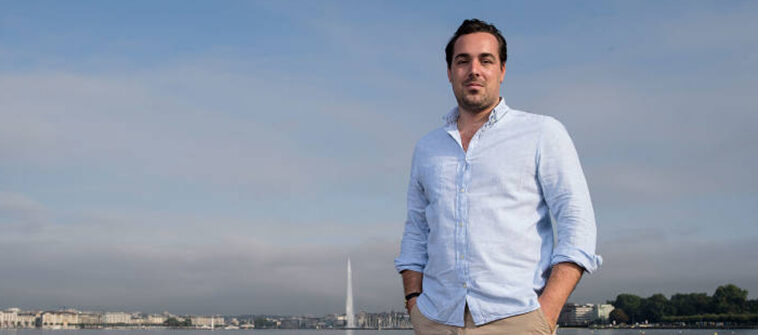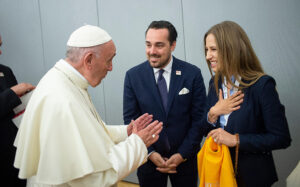
IMD recently met up with Gautier Porot to discuss his experience in the EMBA program, his key role in the Pope’s recent visit to Switzerland, and more.
IMD: You recently graduated from IMD’s EMBA program where we strive for ‘Real Learning. Real Impact’. Why did you decide to commit to this program? What leadership skills have you developed from it?
Gautier Porot: My father is INSEAD, my brother is IE, my two brothers-in-law are Standford and HSG St Gallen. I had no choice but to apply to IMD.
More seriously, IMD has a unique approach regarding executive education. The “only nine weeks away from the office” structure was clearly a game changer. Another convincing argument is how eclectic fellow participants’ backgrounds are. Our 2018 class profile is comprised of people with an average age of 40 with 16 years of business experience, representing 21 nationalities and 30 industries out of 58 participants. What more can I say…
Regarding leadership skills, after serving eight years in the military I was curious to see how this program would influence me in any way. To be honest, this journey has taught me much more than I expected. The top-three leadership skills IMD has enabled me to reinforce and develop are: to lead transversally by adapting my personal style and focus; to delegate thoughtfully and empower subordinates to the best of their ability; and to take bold decisions and implement counter-intuitive approaches.
IMD: Any advice for upcoming EMBA students at IMD?
Gautier Porot: When applying, be transparent and honest. It is essential to highlight how your professional, cultural and personal background will contribute to the class. Be as authentic as possible, as it is difficult to hide your true nature in such a dynamic and diverse environment.
During the program: challenge yourself by doing things you would not do/be able to do in your professional environment; don’t be afraid to learn and to get out of your comfort zone; ask questions to your classmates and let yourself be convinced and challenged by new ideas. After the program: keep in touch with you classmates; keep on reading outside of your area of interest; be an active member of the IMD alumni community network, online and offline.
IMD: Why is it important for you to remain actively engaged with the IMD community? What are the objectives for the club?
Gautier Porot: The IMD Alumni Club in Geneva is one of the most active in the IMD community. We regularly meet for conferences, business related activities and after work drinks. I am currently organizing a keynote speech that will take place in November. For the upcoming event, a close friend of mine who is an important reporter at a well-known newspaper, has accepted to share some of his interviewing techniques and best stories with the club members.
When choosing which EMBA I was going to apply to, one of my top three criteria was the alumni community. I always wanted my EMBA to be a life-long investment that goes beyond classrooms and the graduation party. IMD and its alumni clubs have effective networks and strong, vibrant communities.
IMD: You started serving as a Swiss guard at the age of 18. What sparked that interest?
Gautier Porot: This question is quite a difficult one to answer. A lot of reasons sparked my interest, but if I had to summarize in three words I would say: faith, family and expertise. First, as a roman catholic, I decided I had to give some of my time to serve others. Second, as a descendent of a family with a strong military heritage, this was a once in a lifetime opportunity to join the world’s oldest military corps in one of the world’s most fascinating locations. Third, the Swiss Guard has world-renowned expertise in risk management and physical protection.

IMD: In June 2018, Pope Francis visited Switzerland. What was your role as General Coordinator & Organizer? What was the objective of this event?
Gautier Porot: Pope Francis’ historic visit to Geneva had one major political and religious objective: to bring +300 Christian religious movements together and to re-establish strong interpersonal relationships.
My first role as general coordinator was to manage all political, diplomatic, technical and logistical matters linked to Pope Francis’s ecumenical pilgrimage to the World Council of Churches (WCC). This unofficial “state visit” was composed of multiple interventions (four speeches, three delegation encounters), various protocol duties, exclusive press conferences (one on land, one airborne), and more. As you might imagine, the real tricky part of this role was to deal with numerous stakeholders: the State of the Vatican, the local Catholic Church, the WCC, the Swiss Confederation, and the State of Geneva.
My second role as organizer was to set up, from scratch, a pontifical Mass at Palexpo for 40’000 pilgrims at the end of the visit. To do so, I had to put in place an unpaid Organization Committee of 10 Senior Executives and recruit +300 volunteers.
Despite all these tasks, my two biggest challenges were time and money. I had 79 days for an event that usually takes a year to plan and a tight budget.
IMD: What do you see as the attributes of an effective leader?
Gautier Porot: An effective leader is a mindful and self-aware individual who knows, for every situation, when he or she should step in or step out. Moreover, a good “captain” must be able to adapt his leadership style accordingly. A good leader does not act the same way in times of “peace” as in time of “trouble”.
IMD: You have a Master in criminology from Panthéon-Assas University in Paris, a diploma of general management and military leadership, and a certificate in business intelligence and protection of assets, reputation and information from IHEDN (the Institute of Higher National Defense Studies) in Paris. What’s next?
Gautier Porot:…and an IMD EMBA! For the time being, I want to keep working as an independent consultant in physical risk management. For the past year I have been successfully implementing tailor-made solutions to help my clients (family offices and multinationals) anticipate or deal with at-risk situations. I also want to develop further training modules focusing on crisis leadership, emergency and recovery communication and negotiation.
Find out more about the EMBA at IMD.


